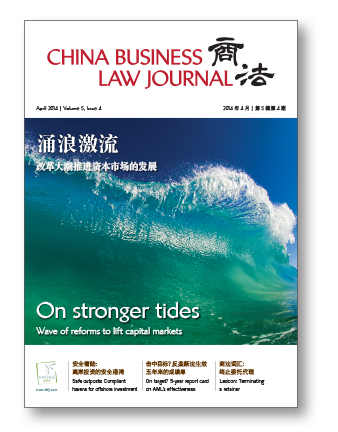Change, like the tide, is inevitable, but how one adapts to the highs and lows is key. In this issue of China Business Law Journal, we explore some exciting market reforms and developments, in China and abroad. Resisting these reforms is like holding back the tide, and our articles demonstrate that seeking ways to capitalise on and ride the fresh currents will keep you in the mainstream of success.

Development of the Third Board remains at the heart of growing a multi-level market structure, and other capital market reforms flagged in November’s Third Plenum include promoting equity financing through multiple channels, developing the bond market and raising the weight of direct financing. There is also, of course, great interest in the opening of China’s securities reservoir to foreign investment via the expanding qualified investor schemes, but foreigners beware of unclear tax policies, particularly with income tax on capital gains.
Departing from home with Safe outposts, the wave of international regulatory constriction over offshore jurisdictions continues with the Organisation for Economic Co-operation and Development’s new common reporting standard for automatic exchange of information on assets held by non-residents with other countries for tax purposes, published in February.
The standard calls on jurisdictions to obtain information from their financial institutions and exchange the data with other jurisdictions, setting out financial account information to be exchanged, the institutions that need to report, types of accounts and taxpayers covered, as well as common due diligence procedures to be followed.
Rather than battle the greater global oversight, leading jurisdictions are actively ensuring their laws and regulations are competitive and compliant in the fight against tax evasion. The tradeoff: some of the traditional confidentiality for preservation of reputation and the freedom to continue to offer nimble financial solutions to Chinese investors. We explore the strategies of various leading jurisdictions.
Finally, On target? examines the effectiveness of the Anti-Monopoly Law (AML) five years after its inception. The article explores the three pillars of the AML – namely merger control, monopolistic agreement and abuse of market dominance – breaking each down with analysis followed by suggestions for the way forward. How effective has the law been as a tool of regulation and enforcement? And how effectively have the relevant authorities adopted and administered the law? One thing is for certain; domestic and foreign violators alike can expect bigger fines and damages imposed in the months to come.





















